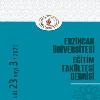Performansa Dayalı Teşviğin Filipinler'de Devlet Liselerinde Görev Yapan Öğretmenlerin Yetkinliğine Etkisi
Herhangi bir eğitim sisteminde, performansa dayalı ödül her zaman olmuştur. Çok fazla tartışmaya yol açsa da, hükümetler çalışanları motive etmek için hala farklı türde ödüller, ikramiyeler veya teşvikler vermeyi planlamaktadırlar. Tarama araştırma dizaynına sahip bu çalışma, Filipinler'deki devlet liselerinde görev yapan öğretmenlerin etkinliğini artırmada Performansa Dayalı Teşvik (PDT) sisteminin etkisini araştırmayı hedeflemektedir. Çalışmaya amaçlı örnekleme ile seçilmiş öğretmenler ve okul müdürleri katılmıştır. Öğretmenlerin PDT uygulamasından önceki ve sonraki etkililiği, Sonuçlara Dayalı Performans Yönetim Sisteminin (SDPYS) sonuçlarına ve öz değerlendirmelerine göre belirlenmiştir. Yapılan bu öz-değerlendirme, yapılandırılmış bir anket kullanılarak okul müdürleri tarafından da doğrulanmıştır. Araştırma sonuçları, öğretmenlerin yetkinlikleri PDT'nin uygulanmasından sonra bile aynı olduğunu gösterirken, okul müdürlerinin değerlendirmesinin ise öğretmenlerin yetkinlik derecelendirmelerinde "Çok Yeterli" den "Yeterli"ye bir düşüşte olduğunu göstermiştir. Bu fark, PDT’nin uygulanması sırasında karşılaşılan sorunlardan kaynaklanmaktadır. Bununla birlikte, bu çalışma, devlet lisesinde görev yapan öğretmenlerinin, parasal ödüllerin varlığına veya yokluğuna bakılmaksızın öğretim yeterlik seviyeleri aynı kaldığı için işlerine sadık kaldıklarına kanıtlamaktadır. Araştırma sonuçları, kişinin kendini ve genel yetkinliklerini geliştirerek öğretmenlik mesleğine bağlı kaldığını gösterip PDT uygulamasıyla bağlantılı temel sorunların ele alınmasına yardımcı olmak için tüm paydaşların aktif katılımının rol alması gerektiğini göstermektedir.
Performance-Based Bonus on the Efficacy of Public High School Teachers in the Philippines
In any educational system, performance-based reward is always present. Though it bears so much controversies, the government is still designing different types of rewards, bonuses or incentives to help motivate employees. The study used survey research design to evaluate the effectiveness of the Performance-Based Bonus (PBB) in improving the efficacy of public high school teachers in the Philippines. Purposively selected teachers and school heads were included in the study. The teachers’ efficacy before and after the implementation of PBB was determined based on the results of the Results-based Performance Management System (RPMS) and their self-evaluation. This self -evaluation was validated by the school heads using a structured questionnaire. The results showed that teachers’ self-efficacy rating was the same even after the implementation of PBB, whereas the assessment of the school heads showed a decrease in the efficacy rating of the teachers from ‘Highly Proficient’ to ‘Proficient’. This difference was due to the problems encountered during the implementation of the PBB. However, the study proves how public high school teachers remain true to their calling as their levels of teaching efficacy remain the same regardless of the presence or absence of monetary rewards. Thus, this calls for an active involvement of all the stakeholders to help address the underlying issues connected to the PBB implementation while remaining committed to the teaching profession by improving oneself and one’s overall efficacy.
___
- Agasisti, T., Bonomi, F., & Sibiano, P. (2014). Measuring the “managerial” efficiency of public schools: a case study in Italy. International Journal of Educational Management, 28(2), 120- 140.
- Harvey-Beavis, O. (2003, June). Performance-based rewards for teachers: A literature review. In paper distributed at the third workshop of participating countries in the OECD activity “Attracting, developing and retaining effective teachers (pp. 4-5).
- Blair, G., Blair, R., & Myers, G. (1964). Educational psychology. The Macmillan Company: New York
- Gatere, M. S. (2015). Teachers’ perception of the performance-based rewards and commitment in public secondary schools in Kikuyu sub-county (Doctoral dissertation). University of Nairobi).
- Johnson, S. M., & Papay, J. P. (2009). Redesigning teacher pay: A system for the next generation of educators (Vol. 2). Washington, DC: Economic Policy Institute.
- Kataha, J. K. (2019). Performance-based rewards and the performance of teachers in private secondary schools: A case study of Mbarara District (Doctoral dissertation). Makerere University.
- Kirunda, H. K. (2004). Performance-based rewards and the performance of teachers in private secondary schools in Kampala district. MA Dissertation.
- Kolb, D. A. (2014). Experiential learning: Experience as the source of learning and development. FT press.
- Lundström, U. (2012). Teachers’ perceptions of individual performance-related pay in practice: A picture of a counterproductive pay system. Educational Management Administration & Leadership, 40(3), 376-391.
- Marsh, J. A., Springer, M. G., McCaffrey, D. F., Yuan, K., & Epstein, S. (2011). A big apple for educators: New York City's experiment with school wide performance bonuses: Final evaluation report. Rand Corporation.
- Muguchu, A. W. (2013). The effectiveness of non-monetary incentives in motivating employees in NGO sector in Kenya: A case of concern worldwide (Doctoral dissertation). Kenyatta University).
- Munga, M. (2013). The relationship between non-financial rewards and teacher retention in private schools in Kirinyaga South District. (Unpublished dissertation). Kenyatta University.
- Ofoegbu, F. I. (2004). Teacher motivation: A factor for classroom effectiveness and school improvement in Nigeria. College Student Journal, 38(1), 81-90.
- Salkind, N.J., and Rasmussen, K. (2008). Encyclopaedia of educational psychology. (Volumes 1 and 2). SAGE Publications, Inc.
- Solomon, L., & Podgursky, M. (2000). Pros and cons of merit pay for teachers: A pointcounterpoint look at the issue from one of the leading practitioners of performance-based compensation. Educational Research Newsletter & Webinars.
- Schaffhauser, D. (2015). Performance bonuses for teachers can perk up students outcomes. National Center for Education Evaluation and Regional Assistance.
- Umil, A.M.D. (2013). Stop implementation of ‘divisive’ incentive system – public school teachers https://www.bulatlat.com/2013/08/02/stop-implementation-of-divisive-incentivesystem- public-school-teachers/
- Yayın Aralığı: Yılda 4 Sayı
- Başlangıç: 1999
- Yayıncı: Erzincan Binali Yıldırım Üniversitesi
Sayıdaki Diğer Makaleler
Akademik Başarı ve Okul Bağlılığı Arasındaki İlişkinin İncelenmesi: Bir Meta Analiz Çalışması
Mustafa YADİGAROĞLU, Hayriye AKAR
Ruffa V. SUELTO-CORDOVILLA, Ruth A. ORTEGA-DELA CRUZ
Farklı Ülkelerin STEM Eğitimi Politikalarının İncelenmesi ve Türkiye İçin Çıkarımlar
Süleyman Sadi SEFEROĞLU, Kerem AY
Öğretmenlerin Mesleki Gelişimlerine Odaklanan Araştırmalar Ne Söylüyor?
Müzik Öğrenme ve Öğretim Yaklaşımları Dersi Hakkında Öğrenci Görüşlerinin İncelenmesi
